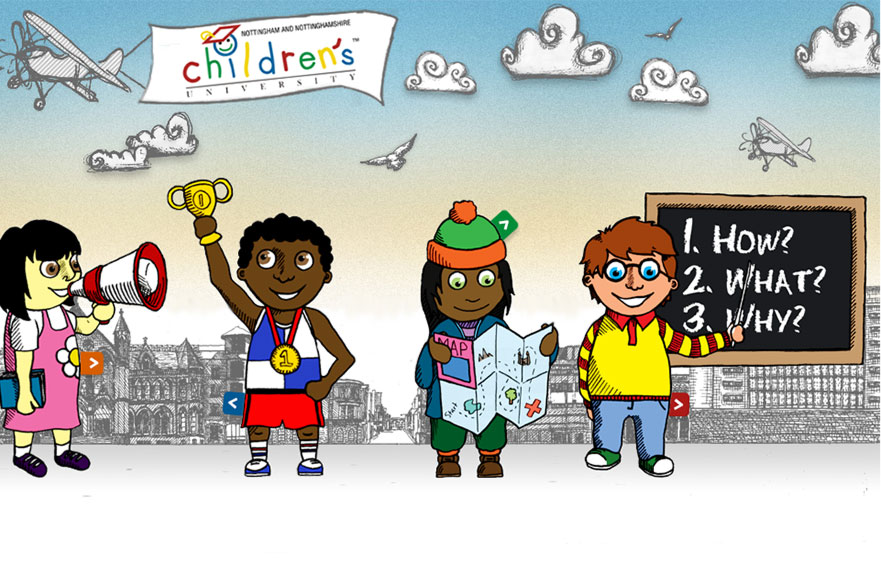Children's University
The Children's University recognises and rewards the learning and activities that children take part in outside normal school hours.

About us
The Children's University recognises and rewards the learning and activities that children take part in outside normal school hours and is open to children aged 7 to 14 if their school has signed up to the scheme. Participation in the Children's University is voluntary.
Children receive a Passport to Learning from their school and they can collect credits for each activity they take part in. Credits can be given for taking part in learning experiences and activities at after school clubs, sports clubs, museums, activity centres, and music groups. This learning doesn't need to be purely academic - often it is focused towards developing the skills that may help children go to university in the future and many of the activities link with university subjects.
If children gain 100 credits they will be invited to attend an awards ceremony at Nottingham Trent University. Please see the Awards page to find out how many credits you need for each award.
Awards
Your school co-ordinator will check your Passport To Learning and tell you when the next set of certificates will be handed out. For your Bronze certificate, you will need 30 hours, 65 hours for Silver and 100 hours for Gold. You will usually have the chance to be presented with your certificate at a special graduation ceremony organised by your local Children's University. Your school co-ordinator will give you details about your ceremony.
This table shows you how many hours you need to complete for all the awards available.
| Achievement level | Award type | Hours required to achieve Bronze | Hours required to achieve Silver | Hours required to achieve Gold |
|---|---|---|---|---|
| Undergraduate | Award | 30 | 65 | 100 |
| Undergraduate | Certificate | 130 | 165 | 200 |
| Undergraduate | Diploma | 230 | 265 | 300 |
| Undergraduate | Degree | 330 | 365 | 400 |
| Postgraduate | Award | 430 | 465 | 500 |
| Postgraduate | Certificate | 530 | 565 | 600 |
| Postgraduate | Diploma | 630 | 665 | 700 |
| Postgraduate | Masters degree | 730 | 765 | 800 |
| Doctorate | Doctorate | 830 | 865 | 900 |
| Doctorate | Fellowship | 930 | 965 | 1000 |
FAQs
Children's University is a national scheme offering children aged 7-14 years an innovative programme of learning opportunities outside normal school hours. CU focuses on rewarding participation, raising aspirations and encouraging engagement with learning.
CU is open to 7-14 year olds, providing their school is part of the Children's University.
CU involves a wide variety of activities that take place outside of the school day and which a child attends voluntarily. They go because they choose to. The activity must be a recognised CU Learning Destination.
Current activities include:
- CU clubs within CU schools which run before school, during lunchtime or after school
- visits to tourist attractions such as museums
- formal sports coaching activities
- participation in clubs and societies which might include music, drama and scout or guide groups.
This is a good place to start as we update these pages with Nottingham and Nottinghamshire CU news and activities. You can also find out more on the national Children's University website.
At your school. Passports are only available through Nottingham Trent University CU partner schools.
There is a small fee per Passport to Learning. Some CU learning destinations may also charge an admission fee. For more information please contact us.
You can collect stamps in your Passport to Learning at your school's CU clubs and activities. CU activities take place outside of normal school hours (before school, during lunchtime or after school). You can also use your passport at the weekend or during school holidays at 'public' CU learning destinations. More details can be found on the National Children’s University website. If you're going on holiday or visiting another town for the day, you might be able to collect stamps in your Passport to Learning by visiting CU learning destinations in other towns, counties and indeed countries!
All Passports to Learning have a sticker in the back with your details, so if somebody finds it they should know to return it to your school.
If no-one finds and returns your passport, then you have buy a new one. Unfortunately you will also lose the hours of learning you have collected. So keep it safe.
There are no exams, but of course you may do examinations as part of your learning, for example in music.
Once you have your Passport to Learning, you decide how many activities you would like to take part in, collecting stamps as you go. If you decide you would like to take a break then you can. When you are interested in doing another Children's University activity, then you can take your Passport to Learning along with you. You choose how many activities you want to do and when. But if you want to leave please let your CU coordinator at school know.
As you collect stamps in your Passport to Learning you will be able to see when you are ready to receive an award. You will receive your bronze and silver awards at your school and be invited to the Nottingham Trent University City Campus to attend a graduation ceremony when you reach your gold award. Your school coordinator will be able to give you more details about receiving CU awards.
Have a look at our useful Understanding university guide.
Learning destinations
For a list of Children's University (CU) learning destinations in Nottingham, Nottinghamshire and beyond, please access the CU Trust learning destination search feature.